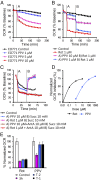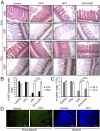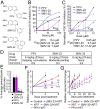Papaverine and its derivatives radiosensitize solid tumors by inhibiting mitochondrial metabolism
- PMID: 30201710
- PMCID: PMC6196495
- DOI: 10.1073/pnas.1808945115
Papaverine and its derivatives radiosensitize solid tumors by inhibiting mitochondrial metabolism
Erratum in
-
Correction for Benej et al., Papaverine and its derivatives radiosensitize solid tumors by inhibiting mitochondrial metabolism.Proc Natl Acad Sci U S A. 2018 Dec 4;115(49):E11561. doi: 10.1073/pnas.1818732115. Epub 2018 Nov 19. Proc Natl Acad Sci U S A. 2018. PMID: 30455291 Free PMC article. No abstract available.
Abstract
Tumor hypoxia reduces the effectiveness of radiation therapy by limiting the biologically effective dose. An acute increase in tumor oxygenation before radiation treatment should therefore significantly improve the tumor cell kill after radiation. Efforts to increase oxygen delivery to the tumor have not shown positive clinical results. Here we show that targeting mitochondrial respiration results in a significant reduction of the tumor cells' demand for oxygen, leading to increased tumor oxygenation and radiation response. We identified an activity of the FDA-approved drug papaverine as an inhibitor of mitochondrial complex I. We also provide genetic evidence that papaverine's complex I inhibition is directly responsible for increased oxygenation and enhanced radiation response. Furthermore, we describe derivatives of papaverine that have the potential to become clinical radiosensitizers with potentially fewer side effects. Importantly, this radiosensitizing strategy will not sensitize well-oxygenated normal tissue, thereby increasing the therapeutic index of radiotherapy.
Keywords: hypoxia; metabolism; mitochondria; radiosensitization.
Conflict of interest statement
The authors declare no conflict of interest.
Figures





Comment in
-
A potential solution for eliminating hypoxia as a cause for radioresistance.Proc Natl Acad Sci U S A. 2018 Oct 16;115(42):10548-10550. doi: 10.1073/pnas.1814212115. Epub 2018 Oct 9. Proc Natl Acad Sci U S A. 2018. PMID: 30301796 Free PMC article. No abstract available.
References
-
- Brown JM, Giaccia AJ. The unique physiology of solid tumors: Opportunities (and problems) for cancer therapy. Cancer Res. 1998;58:1408–1416. - PubMed
-
- Harrison DK, Vaupel P. Heterogeneity in tissue oxygenation: From physiological variability in normal tissues to pathophysiological chaos in malignant tumours. Adv Exp Med Biol. 2014;812:25–31. - PubMed
Publication types
MeSH terms
Substances
Grants and funding
LinkOut - more resources
Full Text Sources
Other Literature Sources
Medical

